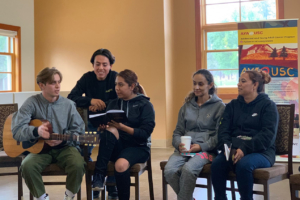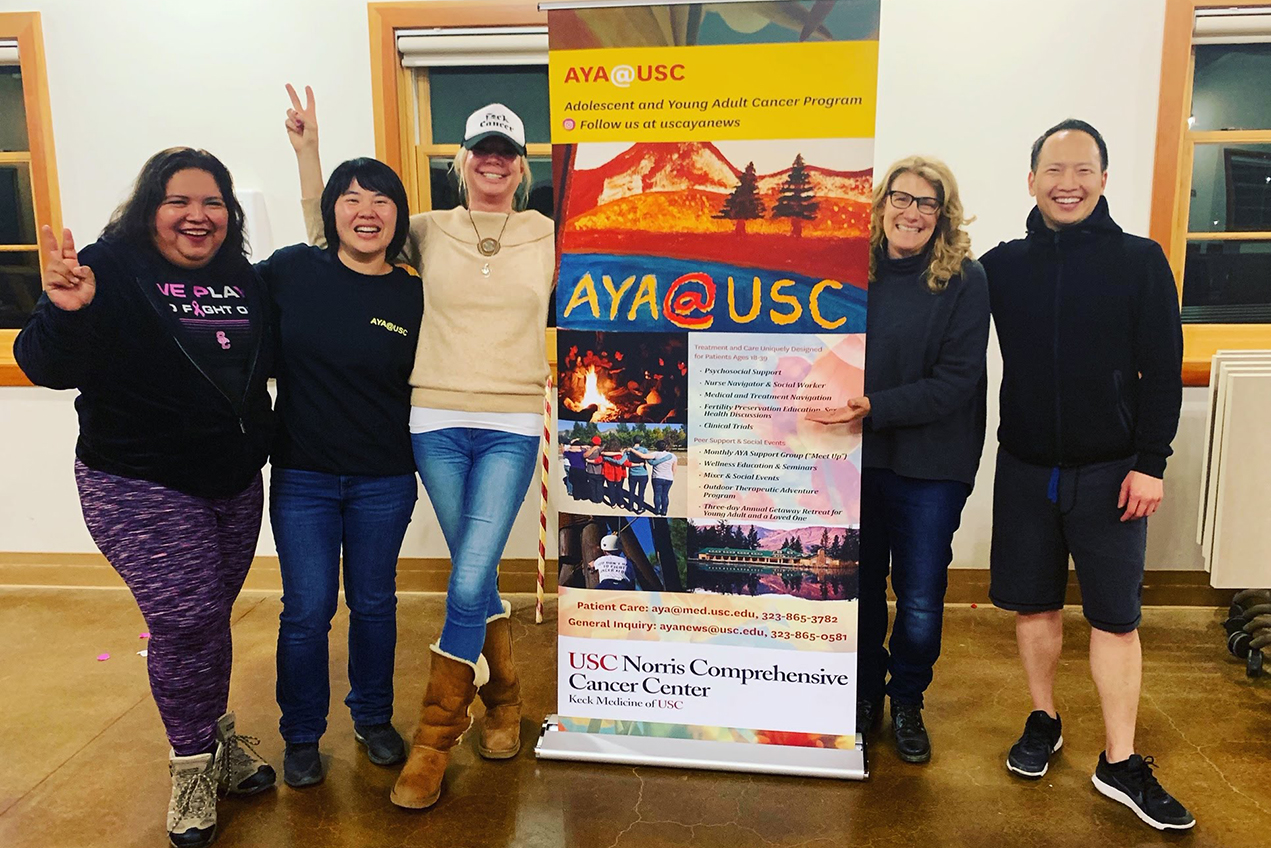A group of young adult cancer patients, survivors and their caregivers connected deeply with compassion, passion, friendship and support at Camp Ronald McDonald during the AYA@USC Retreat, held Sept. 27-29 in Idyllwild. This is the third year that AYA@USC, the Adolescent and Young Adult Cancer Program at USC, has offered this event to bring adventure, peace and joy to young people with cancer.
The retreat was initiated by AYA@USC staff member Aura Kuperberg, who worked at Children’s Hospital Los Angeles for more than 30 years and founded the Teen Impact Program prior to coming to the AYA@USC program. She discovered the gap in addressing the social and community needs for young adults and reached out to the Audrey Irmas Foundation for Social Justice, which shared the same vision about providing a unique opportunity for young adults to get away from the stress and anxiety in life and form a strong support community to share and thrive together.
AYA@USC, housed under USC Norris Comprehensive Cancer Center, was established in 2013 to provide supportive care and address the psychosocial needs of adolescent and young adult (AYA) cancer patients.
Getting to know others in similar situations
Even though most of young people did not know each other and were shy at the beginning, the participants quickly bonded through activities that included a rope challenge, archery, fishing, music composition, painting, journal-making and a bonfire.
The Saturday night show included performances by three comedians: Jon Rudnitsky, Jake Nordwind and Quincy Jones, who is cancer survivor himself. Rudnitsky, who recently had his late-night stand-up debut on CONAN and was added as the only new cast member of the 41st season of “Saturday Night Live”, said: “I want to bring my comedy to a program whose purpose is to bring a sense of community amongst young adults dealing with cancer. The retreat at AYA is such a wonderful way for cancer patients and survivors to both discuss together and get away from the everyday heaviness that the disease can bring. And if I can bring some laughter into the mix, then I feel like I have contributed to this fantastic program/retreat in some small way.”
The indie-electronic band Moontower, consisting of four new graduates from USC Thornton School of Music, not only shared with the group their songs, but also worked with the group to compose songs, like, “A Better Place” and “Sometimes Your Socks Will Get Wet.”
The AYA group also celebrated the 39th birthday of one of the first retreat participants, Ghecemy Lopez.
Finding a safe space to share experiences

Activities at the retreat included music composition, where participants worked with USC Thornton School of Music graduates to compose songs inspired by their experiences as cancer patients. (Photo/Courtesy AYA@USC)
Encouraged by the atmosphere of love and kindness from AYA staff, camp counselors and volunteers, the participants opened up about how cancer has changed their lives and relationships, their challenges in physical, medical, emotional, family, work and financial aspects and many other areas, as well as how they have redefined their priorities and perspective in life.
One girl who just graduated from college and lives by herself in Los Angeles shared how hard it is for her to face life after her boyfriend broke up with her following her cancer diagnosis and the lack of confidence and certainty in job-seeking due to after-effect sleeping problems.
“I do not know how to put my life back together after getting cancer. I do not have motivation to cook or even to get up. My parents moved to another state and I can’t even go back to where I grew up. I really want to get to know people, especially people who are like me,” she shared. She found out about the retreat the night before through social media and immediately was contacted by AYA staff the same night. It took her two hours to ride different buses from west Los Angeles the next day to arrive at the Health Sciences Campus to join the retreat bus, but said she received so much encouragement and support during the retreat from her peers that she felt more comfortable to kick off the beginning of her new life.
“Cancer actually made me a better person now. I truly care about people around me and want to help them in any way I can because I know how hard life can be,” said another participant who was actively helping everyone during the camp. He and his fiancé have raised six children in Los Angeles.
Treating a specific population
In the United States, more than 70,000 AYA patients (age 15-39) are diagnosed with cancer each year. During cancer care and throughout survivorship, these AYA patients face greater challenges of daily life than other young people without cancer, which also differ significantly from those of cancer patients in younger or older age groups. These stressors can result in overwhelming emotional distress that in turn can lead to poor treatment outcomes.
Working groups such as the National Comprehensive Cancer Network (NCCN) have issued recommendations to address these unique challenges of the AYA population, including evaluation and follow up by social work services, physical therapy, psychological interventions as needed, and practical interventions that include financial assistance and navigation through the healthcare system. This has led to the further recommendation that AYA patients receive care at centers that are equipped to address all of these needs, including emotional and psychosocial issues.
Supervised by two medical directors and partnered with an interdisciplinary team of health care providers, an AYA@USC social worker and nurse navigator assess and monitor the distress level of patients starting from diagnosis throughout the treatment period. They help patients navigate the health system, ensure their medical appointment and follow up care, provide fertility and sexual health education, as well as assisting patients with various tools and social resources to address their emotional, practical, family, work and spiritual needs, and to improve their coping skills to adapt to important life changes.
Isolation is one of the biggest emotional and social challenges experienced by AYAs. Many of them miss the normal things they used to do with their friends and family, or feel nobody understand what they are going through. Through the wide array of AYA@USC social activities, outdoor adventure and annual retreat, patients and caregivers are able to enjoy art, music and nature to regain their energy and passion for life.
— Shu Li


